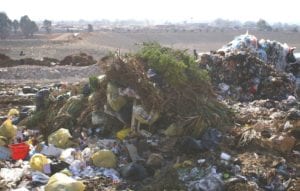Lawi Joel reports in the Tanzania Daily News that Dar es Salaam produces on average 4 100 tonnes of municipal waste every day but is able to remove only 50% of the load. Joel says the city is “choking in its own waste”.
Waste, if improperly disposed, does not only cause pollution but also contributes to climate change. In Dar es Salaam, most of the waste lies in the open because of inefficient disposal methods. “The result is that the city is hotter in places because heaps of waste is left for long before disposal, decaying and polluting water lines with its sludge.” The National Environment Management Council (NEMC) of Tanzania says this difference of temperatures in various areas of the city is a result of methane produced by decaying rubbish, in addition to other factors like high concentration of buildings and people. “Methane is one of greenhouse gases,” explains NEMC’s Environmental Engineer James Ngeleja. “They trap heat from escaping out of the earth’s surface, but if they increase in amount, they cause a rise in temperature.” Methane is 20 times more effective in trapping heat in the atmosphere than carbon dioxide. Human-influenced sources include landfills, natural gas and petroleum systems, agricultural activities, coal mining, stationary and mobile combustion, waste water treatment and certain industrial process. Natural sources of methane have conventionally been thought to be dominated by wetlands. Where soils are waterlogged and oxygen concentrations are low or zero, a group of micro-organisms called methanogens may produce large amounts of methane as they respire carbon dioxide to derive energy. Ngeleja notes that waste needs to be carted off quickly enough to dumps where it should be treated accordingly. But its poor collection and delay in its disposal leaves the air polluted with smoke from spontaneous fires that erupt at the dump sites. Moreover, e-waste is also a growing problem in the country which is now being tackled at government level. But the problem does not end there. Unplanned construction of buildings in Dar es Salaam has rendered many waste collection centres inaccessible.This violation of the city’s master plan has also caused poor drainage and sewage disposal poor. Leakage of water lines is rampant and has made many places unhealthy. The NEMC has passed the buck saying local government authorities are first and foremost to blame for the unplanned construction of buildings in Dar es Salaam, a fact that has aggravated pollution in the city.
“They are the ones to inculcate in people the culture to keep their environment clean and ensure immediate disposal of the collected waste takes place,” says environmental engineer Dr Robert Ntakamulenga. “If we start at this level where every individual has a responsibility to keep their environment clean, the city of Dar es Salaam will be a healthy place to live in.” He says the fact that buildings cropped up in non-surveyed areas of the city without permission from the authorities was clear evidence that laxity and irresponsibility of various responsible bodies in the city ruled. “The construction of a building cannot start without a permit to do so and the construction is inspected and approved at its every stage. It is therefore surprising and indeed a pity that people can have their houses pulled down because the buildings had not in the first place been constructed according to authorised plan by the city’s authorities.” Dr Ntakamulenga says that it is not the duty of NEMC to work out a waste management system, not to have in place a building construction. “According to Sections 7 and 8 of the Framework Law, the municipalities have the mandate to keep the city clean. NEMC is merely an overseer,” he explains and adds, “Our posture is eyes on, hands off.” The national environmental council only steps in when they see something is going wrong or has already been so and an action needs to be taken to make a correction to restore order. “But we can’t be everywhere at the same time,” he says. http://allafrica.com/stories/201211140112.html






